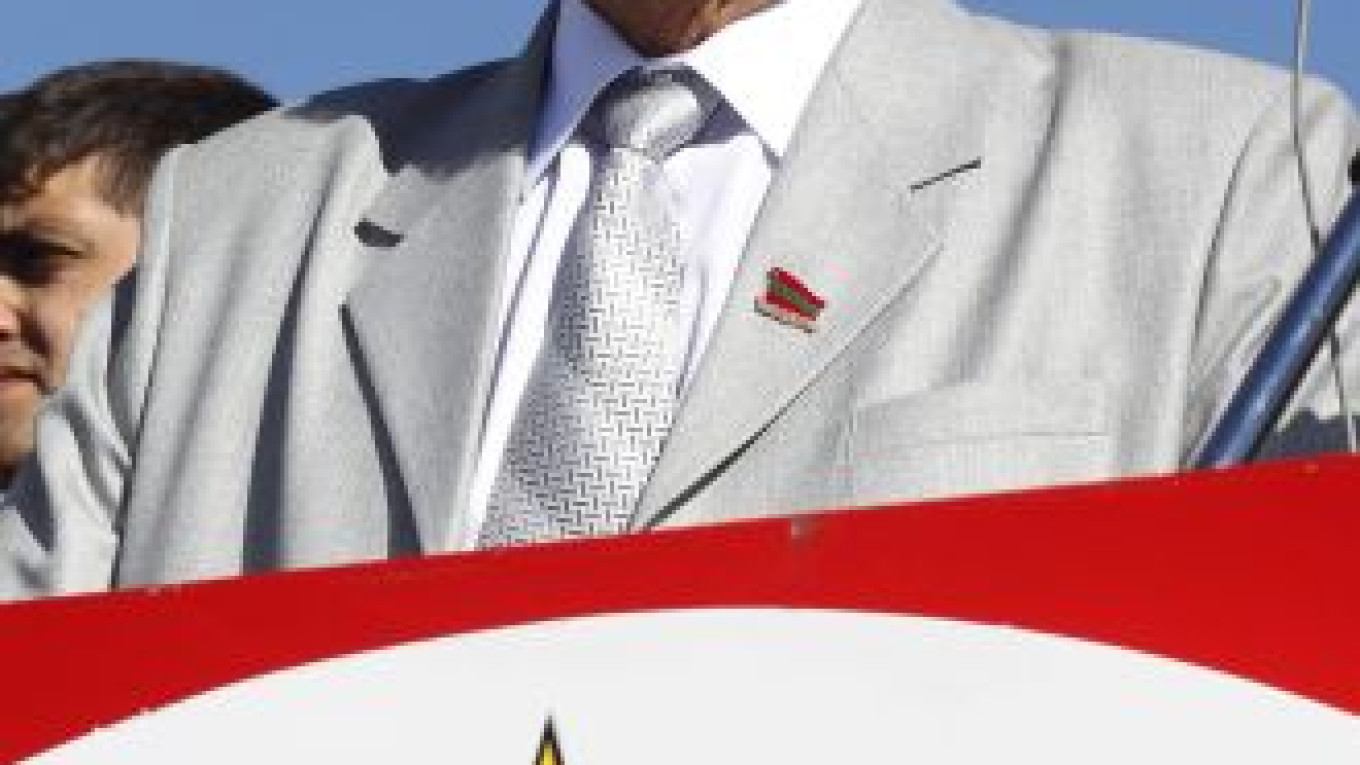TIRASPOL, Moldova — Shunned by the world community and held at arm's length even by main ally Russia, Moldova's tiny rebel Transdnestr defiantly marked 20 years of unilateral independence in full Soviet style Thursday.
Tanks rolled down the capital's main thoroughfare in a show of saber rattling, while veteran separatist leader Igor Smirnov praised Russia for keeping its troops there as a guarantor of stability and attacked "nationalist fascists" in Moldova.
A ragged strip of land running down Moldova's eastern border with Ukraine, Transdnestr, population 600,000, is not recognized internationally by any country.
But Smirnov, who has led the territory since it broke with Chisinau in 1990, said the examples of Kosovo and Georgia's South Ossetia and Abkhazia showed that time was on Transdnestr's side.
"We have the attributes to be recognized," he said.
Analysts see no breakthrough in prospect to end the Transdnestr conundrum — one of four "frozen" conflicts left over from the Soviet Union's breakup.
Russian-speaking secessionist leaders said they broke with Chisinau because they were worried that Moldova would unite with Romania — with which Moldova has linguistic, historical and cultural links — leaving them stranded in an alien environment.
Separatist forces went on to fight a brief war with Moldova in 1992 in which several hundred people were killed before a cease-fire was agreed upon.
Even though its fears of a Moldovan union with Romania proved unjustified, Transdnestr continued to go it alone, wrapped in a time warp of Soviet traditions and trappings.
Thursday's ceremony had all the pomp of a Soviet-style festival, set on a small stage.
Stirring national music rang across Tiraspol's Suvorov square and verse recited over loudspeakers lauded 20 years of building a prosperous society.
Grad missiles were towed down the street following a tank display and military march past.
Russian investment has poured in over the past 20 years.
Many in the West and in Moldova say the territory has long since become a black hole in Europe and a hotbed of crime, money laundering and trafficking. Transdnestr authorities deny this.
The role of up to 1,200 Russian peacekeeping troops is a constant irritant for Moldova, now led by a pro-Western coalition that wants to take the nation into the European Union.
The Organization for Security and Cooperation in Europe has urged Moscow several times to withdraw its forces, but they remain in place despite promises by Moscow to pull them out.
At the same time, Moscow has shown little interest in Smirnov's calls for Transdnestr to be integrated into Russia, nor has it responded to his regular urging for it to increase the size of its forces.
"A settlement depends almost entirely on a willingness by Moscow to withdraw its troops and stop supporting the separatist Transdnestr regime," said David Kramer, a former U.S. representative in international talks on a settlement.
"Absent Russian support, the conflict would move toward resolution fairly quickly. But I see no signs of Russian interest in solving the problem," he said.
Seeing some movement toward a settlement is, however, vital for Moldova's new leaders, who are striving to get a firmer grip on power after ousting the communists.
A referendum in Moldova on Sunday is expected to approve switching to electing the president by popular vote — something the new leaders hope will strengthen their hold.
Long-running talks on Transdnestr under the OSCE, Russia and Ukraine have borne little fruit. Equally, attempts by Moldova to put economic pressure on the territory have had little effect.
On the eve of the ceremony, the Chisinau leadership issued a statement urging foreign governments not to take part in the celebrations, saying they were led by forces that wanted to preserve the old Soviet Union.
Foreign Minister Sergei Lavrov turned down an invitation to attend but sent Russia's ambassador from Chisinau.
A Message from The Moscow Times:
Dear readers,
We are facing unprecedented challenges. Russia's Prosecutor General's Office has designated The Moscow Times as an "undesirable" organization, criminalizing our work and putting our staff at risk of prosecution. This follows our earlier unjust labeling as a "foreign agent."
These actions are direct attempts to silence independent journalism in Russia. The authorities claim our work "discredits the decisions of the Russian leadership." We see things differently: we strive to provide accurate, unbiased reporting on Russia.
We, the journalists of The Moscow Times, refuse to be silenced. But to continue our work, we need your help.
Your support, no matter how small, makes a world of difference. If you can, please support us monthly starting from just $2. It's quick to set up, and every contribution makes a significant impact.
By supporting The Moscow Times, you're defending open, independent journalism in the face of repression. Thank you for standing with us.
Remind me later.


